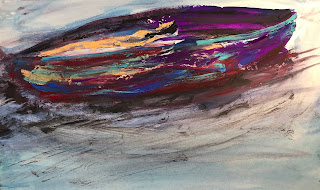Pioneer Amphibian Haiku.
Their fossil remains
Behind glass like a trophy
won by some strange luck.
I Hate Poetry.
Ridiculous
sentimental bullshit -
cheap jokes
with senseless syntaxes -
vignette hybrids with
ripped off riffs and spilt guts
that get scribbled down and
read aloud by deadbeats,
liars and intellectuals alike -
full of self promotion,
delusions, excuses and
at least one award
that nobody’s ever heard of.
They’ll slurp your entrails like
Spaghetti for attention,
break your heart for a good line -
but most of this is bravado to
conceal the wounds of
a delicate and dreamful soul.
So it’s probably best
not to take a poet,
or poem too
seriously.
As it Settles.
Her cute smile like
a welcomed ceasefire,
her mind razor sharp
but embedded in fun,
her skin soft and salty,
nipples brown and perky,
her happy memory
lingering long after
the sheets are washed,
grinning back at me
before it softly settles
elsewhere in my mind
and I’d like it
to stay.
A Poem for a Bar in Bilbao,
That Definitely Wasn’t a Casino.
I drink a cheap glass of red wine
with a warmed slice of
Empanada de Atún
whilst outside the heavens have opened
and are flooding the streets.
Across the windowless bar
my eyes follow some neon pink lights
and I notice a hallway that’s lined
with slot machines and ask the young
latin woman behind the bar
if I’m in a casino?
To which she smiles
and shakes her head -
I down the rest of the wine,
take the final bite of my lunch
and leave like a moth
towards the artificial light.
Down the hallway two old men
sit at slot machines and at the far end
of the hallway a large room is
being used as a geriatric gambling den,
with a roulette wheel and a gang of
elderly women and men sat around
playing cards.
I turn back to an unoccupied
slot machine in the hallway
put in six Euros -
lose four,
get lucky
win fifty
and swiftly cash out.
The old man to my right
jealously glares at me like a drunk
eyeing up the drinker that’s able to
get blotto from a single beer -
I’m a mere tourist to his addiction.
I bundle the cash into my pockets,
as the hombre to my right then
arduously reaches towards me
with his long bony arms,
as if he’s somehow been cheated.
I smile and wander back to the bar
where the girl asks me if I’d
like another drink?
This time I shake my head.
Outside the storm’s cleared and I decide
that I’ll visit The Guggenheim
with my winnings -
they’ve got Picasso and Van Gogh there
and that’s a far safer bet.
Gwil James Thomas is a poet, novelist and inept musician originally from Bristol, England. He is a Best of The Net nominee whose written work can be found widely in print and also online. He’s worked as a chef, a labourer, an aeroplane cleaner, a dishwasher, a product demonstrator and a news article archivist. He is currently laying low somewhere in Northern Spain. His fourth poetry chapbook Writing Beer, Drinking Poetry (Concrete Meat Press) is available here: https://adrianmanning.wixsite.
Find more work by Gwil James Thomas on BM here: https://georgedanderson.blogspot.com/2020/05/featuring-gwil-james-thomas.html




